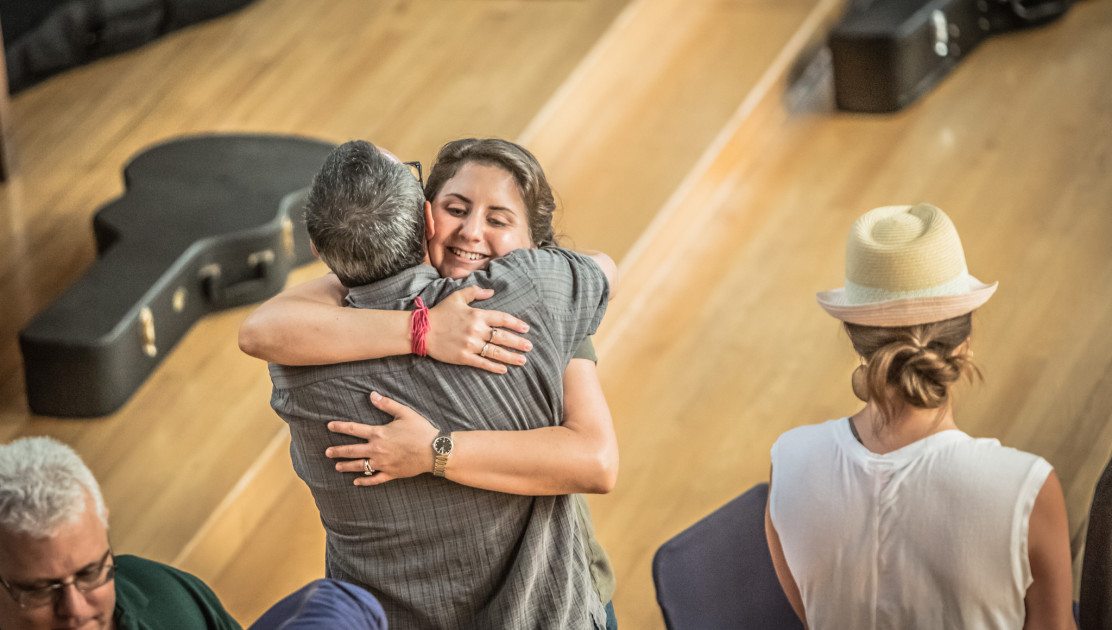Real Love
The Power of Paying Attention
By Sharon SalzbergI used to think of love as something that could be delivered to me from another person, like a UPS package. But then, if the delivery person got to my doorstep and realized they were at the wrong address, they could take the love right out of my hands and it would be gone. Some types of love are like that: very fragile because they are dependent on someone else.
But real love, I think, is more sustainable. I remember an experience I had in Burma in 1985 when I was doing an intensive lovingkindness practice. While meditating, I realized that love is a capacity I have inside me. It’s a capacity for deep connection with myself and other people. It’s mine, in other words. While other people may embellish it, enhance it, nourish it, or threaten it, ultimately it’s within me.
When you think of love in this way, you’re no longer waiting for the perfect person to stay perfect or the conditions to be perfect. The common cultural conception of romantic love is pretty full of heartache. There is a lot of wanting and needing and there can be a lot of inauthenticity in the way you try to present yourself in order to be desirable. Or we think that if we’re in love then we lose discernment and become all gooey. It doesn’t have to be that way.
Instead of being full of needing and wanting, love can be empowering. When you see love as something that you have inside of you, you also begin to see it as a quality you can cultivate. It isn’t just something you have in a certain measure of and if you don’t have it then you’re out of luck. Love is an emergent property of how we pay attention. It’s like if you’re at a party and you’re talking to somebody and you’re not really listening, there’s not likely going to be any sense of connection. But, if you start to listen, you might realize that your capacity for connection has grown.
So one way to train in love is to train in attention. When you’re more present—and less filled with assumption and preconception—all kinds of things emerge from that, including lovingkindness and compassion.
However, it’s important to note that love for another won’t really be free unless there’s some amount of love for one’s self. In the end, there is a kind of balance between love for self and love for other that’s struck. Some people have told me that, for them, the movement toward real love was through actually voicing their feelings to another. For example, a friend of mine once told me, “I used to be the kind of woman who’d be riding in the car with my husband, and I’d be boiling hot, and the most I could bring myself to say was, ‘Are you warm dear?’ instead of saying ‘I’m really hot.’” For her, the movement was very different than a person who is so self-preoccupied and needs things to be their own way. She needed to give voice to what she really needed.
For each of us the balance is going to look different, and it’s going to look different at different times. We’re not only giving, we’re also receiving. And we’re not only receiving, we’re also giving. It’s pretty intricate, actually, but authentic love is found in that balance.

PRACTICE:
Lovingkindness Meditation
Lovingkindness is a meditation practice that is a way of experimenting with our attention. What do we pay attention to, who do we pay attention to, how do we pay attention? If we are in the habit of only fixating on what we’ve done wrong, for example, the exercise of lovingkindness would be to open also to the good we do, the good within us. Not to try to pretend that’s all there is, but to have a fuller, truer picture of who we are, a picture more realistic, more whole. If we’re in the habit of paying attention to some and disregarding others, looking right through them, ignoring them, whether other people, or creatures, other forms of life, in lovingkindness meditation we stop, we pay more full attention, we open, we take interest.
The practice of lovingkindness meditation is done by silently repeating certain phrases, which are the expressions of the heart, wishing well for ourselves or for others. You don’t have to try to manufacture a certain emotion or feeling, or fabricate anything. The power of the practice is in the gathering of all our attention, all our energy behind each phrase.
In this practice it’s very good to be comfortable, if you’re sitting or lying down. You can close your eyes or not. And begin the offering of lovingkindness to yourself, ‘May I be safe, be happy, be healthy, live with ease.’ Repeat the phrases with enough space and enough silence so that it’s pleasing to you. Gather all of your attention behind one phrase at a time. If you find your attention wandering, don’t worry about it. You can simply let go and begin again.
‘May I be safe, be happy, be healthy, live with ease.’ Feelings may come and go, memories may come and go, allow them to arise and pass away. Here the touchstone is the repetition of the phrases. You don’t have to block anything else and you don’t have to follow after it. ‘May I be safe, be happy, be healthy, live with ease.’
Call to mind someone who’s helped you, they’ve been good to you, or kind to you, or maybe you’ve never met them but they’ve inspired you. If someone like that comes to mind, bring them here. You can get an image of them, say their name to yourself, get a feeling for their presence, and offer the phrases of lovingkindness to them. Wishing for them, just what it is you’ve wished for yourself. ‘May I be safe, be happy, be healthy, live with ease.’ Even if the words don’t fit totally, it doesn’t matter, they’re the conduits of your heart, they’re the vehicle for connection. ‘May I be safe, be happy, be healthy, live with ease.’
You can let thoughts, emotions, memories, arise and pass away, without clinging to them, without condemning them. Maybe you have the thought “What does she need me for, she’s so great?” or “What does he need me for, he’s so great?” Just let it come and go. Your attention can steady on the repetition of the phrases.
And call to mind someone you know who’s hurting, who’s having a difficult time right now. Bring them here. You can get an image of them, say their name to yourself, get a feeling for their presence, and offer the phrases of lovingkindness to them. ‘May I be safe, be happy, be healthy, live with ease.’
If you find your attention wandering, you needn’t be discouraged, just gently let go, and come back, one phrase at a time.
Call to mind someone you might encounter now and then, a neighbor, a checkout person at the supermarket, someone you don’t really know, perhaps you don’t even know their name, the first person like that, that comes to mind. And bring them here, even not knowing their story, you can know that they want to be happy just as you do, that they’re vulnerable to pain or loss just as you are, and you can wish them well. ‘May I be safe, be happy, be healthy, live with ease.’
And then all beings everywhere, all people, all creatures, all those in existence, known and unknown, near and far. ‘May I be safe, be happy, be healthy, live with ease.’
You can direct the force of the lovingkindness to all beings in front of you, every form of life.
And to either side.
All beings behind you.
Above.
And below.
The connection to the boundlessness of life, in all directions.
May I be safe, be happy, be healthy, live with ease.
And when you feel ready, you can open your eyes.
Sharon Salzberg is a meditation teacher and Board Member at the Garrison Institute. She is the author of many books, including the New York Times bestseller Real Happiness.
Sharon’s next retreat at the Garrison institute is “People Who Care for People,” on March 10 – 12, which she is coleading with the Holistic Life Foundation.

May all be loved
May all be feed
May all be present
May all be healthy
May all find joy
May all find peace
We Are One!
I have enjoyed your work..Thank you Sharon Salzburg.
PS I have been meditating to “loving kindness ” It’s life changing.
Thank you so much for sharing the art of your loving-kindness.
Attention, Compassion, Attention, Compassion, Attention…Presence.
Thank for your gracious, gentle words of coaching into mindful, attentive, compassionate loving.
May all beings awaken to love on earth.
Educational!
Love is a powerful force. I believe that it is the most powerful source we have access to. Learning to love deeply takes time, takes effort, but all along the way it feels joyful. Thank you Sharon for your gifted teachings.
XOXOXOX
Such sweet simple beautiful truth. Thank you.
In all this discussion of love and kindness, I wonder:
Is the author Vegan?
Are the comments above written by Vegans?
If not, you ALL have far too go. ………
Thanks for the condescending drivel, Simone.
I would shake your hand but I can’t see to the top of your spiritual pedestal.
Have a happy day.